The Spiritual Benefits Of 'Liquid Bread': How These Monks Took Up Beer For Lent

Some of us may seek to give up alcohol for Lent. But back in the 1600s, a certain group of Catholic monks took it up in a big way during this season of fasting, by shunning solids and relying instead on 'liquid bread': otherwise known as beer.
In the 17th century, Paulaner monks moved from Southern Italy to the Cloister Neudeck ob der Au in Bavaria, the Catholic News Agency explains.
'Being a strict order, they were not allowed to consume solid food during Lent,' the current beer sommelier of Paulaner Brewery, Martin Zuber explained in a video on the company's website.
Needing something other than water to sustain thesmelves, the monks concocted an 'unusually strong' doppelbock brew of beer, full of carbohydrates and nutrients, because 'liquid bread wouldn't break the fast,' Zuber said.
The monks eventually sold the brew in the community and it was an original product of Paulaner brewery, founded in 1634.
They named the beer 'Salvator' after 'Sankt Vater,' which 'roughly translates as "Holy Father beer,"' Zuber said.
Paulaner now produces beer for 70 countries and is one of the bigger breweries featured at Munich's Octoberfest.
A modern day Lenten 'beer fast' has subsequently been tried. A journalist in 2011 read about the monks' plight and emulated it. J. Wilson, a Christian working as an editor for a county newspaper in Iowa in the US, partnered with a local brewery and brewed a special doppelbock beer that he consumed over 46 days during Lent, eating no solid food.
Having obtained permission from his boss for the special fast, and going for regular check ups with his doctor, Wilson sustained himself on four beers over each working day and five beers on Saturdays and Sundays.
After a couple of days, any notion of being drunk – or indeed hungry – disappeared and Wilson developed a special kind of 'focus'.
Wilson realised 'that the human body is an amazing machine,' he wrote in a blog for CNN.
'Aside from cramming it [the body] full of junk food, we don't ask much of it. We take it for granted. It is capable of much more than many of us give it credit for. It can climb mountains, run marathons and, yes, it can function without food for long periods of time,' he wrote.
Wilson noted that after being acutely hungry for the first several days of Lent, 'my body then switched gears, replaced hunger with focus, and I found myself operating in a tunnel of clarity unlike anything I'd ever experienced.'
He ended up losing over 25 pounds over the course of the Lenten season and developed other areas of 'self-discipline'. One was stepping away from the media: he found himself declining interview requests and focusing on the spiritual side of his fast.
'It left me with the realization that the monks must have been keenly aware of their own humanity and imperfections,' he wrote. 'In order to refocus on God, they engaged this annual practice not only to endure sacrifice, but to stress and rediscover their own shortcomings in an effort to continually refine themselves.'











